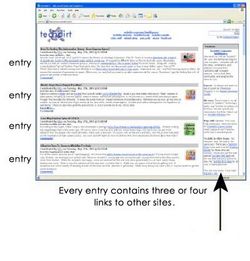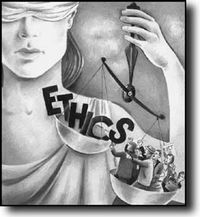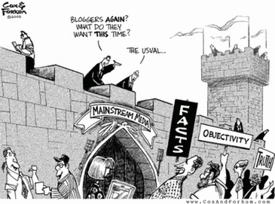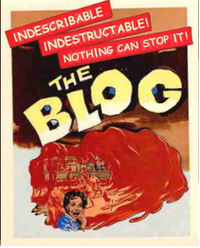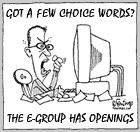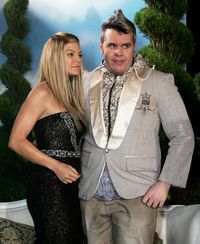Blogs Validity and Credability
Contents
Blogs Validity and Credibility
==Group Members:== [[1]]
Mackenzie Cann
Joanne Mallett
Mandy Adams
Sean Iannuzzi
Technology and Issue
Technology: Blogs
Issue: Validity and Credibility
Project Statement:
Within the last 4 years blogs have become considerably mainstream as a form a new media. As a form of participatory media people began to use blogs as a place to provide commentary or news on a chosen subject while others use them more as a “personal” online diary. As with any form of media, there are several substantial issues which surround blogs, including validity and credibility. Because blogs lack editors and “layers of review,” which are important features of journalism, they sometimes come into question with providing society with valid and credible content. Our group is interested at taking a further look into this issue surrounding blogs so that we can gain a better understanding of this increasingly popular form of new media.
Blogs
The history and origin of modern blogging is not clear and concrete. It was not one person but rather a network of people who worked off each other’s contributions which has lead to the blog as it is today. A blog is basically an online journal or diary that easily allows information and ideas to be shared. The name blog was actually coined from the derivative of web logs (5). The concept of a blog centers on simplicity. Normally a blog is a single page of entries but they can also have archives of older entries. A key characteristic of blogs is that they are organized in reverse-chronological order. The most recently added entry is displayed first on the main page and continued down in chronological order (2). Blogs are also immediate, in the sense that as soon as a blog is edited it will instantly be updated.Blogs are normally public and available to anyone at anytime. A blog can contain text, hypertext, images, and links to video, audio and other web pages. Not only are blogs easily edited but created. At the website blogger.com (1), it only takes a few short and simple steps, that lead even the most computer-illiterate through, creating your own personal blog. Blogs are a participatory media that use a conversational style of documentation. They can be focused on an array of particular interests such as: political, personal, business, health, travel, literary, research, legal or educational topics (4). For visual examples see The World of Blogs
This wiki in particular is focused around the discussion of journalism blogs. These blogs are of prime interest for the fact that they invoke both criticism and debate. One serious argument that blogs consistently are faced with is the issue of whether or not they should be deemed credible or valid pieces of journalism, or even journalism at all. These fact alludes to blogs most attractive yet also most dangerous asset; the ability to edit freely. Being able to edit blogs free of restrictions and rules has lead largely to their success yet has also lead to some severe skepticism.
Ethics and Blogging
"Let me propose a radical notion: The Weblog's greatest strength - its uncensored, unmediated, uncontrolled voice - is also its greatest weakness" - Rebecca Blood
Before we approach the concept of ethics within blogging, let me first define the idea of what is "ethical". Wikipedia defines ethics as "a major branch of philosophy, encompassing right conduct and good life. It is significantly broader than the common conception of analyzing right and wrong" (24). Basically, ethics are the moral conduct of how a person lives their lives. The rest of this article will explain what ethics in blogging are.
Blood postulates that weblogs are the "mavericks" of the online universe. She calls them mavericks because they are unpredictable, hard to control, and are a new face of the online world that has no precedent. "Two of their greatest strengths are their ability to filter an dissimate information to a widely dispersed audience, and their position outside the mainstream of mass media" (22). Essentially, bloggers can spread information to huge audiences, but are held less accountable for the validity and credibility of their content than traditional, mainstream reporters.
Being a non-professional, self "employed" writer can often lead to reporting for the sake of speed and sensationalism rather than focussed, factual analysis. thus, many bloggers feel there is a need for "self-policing", that is, to say, keeping one's self accountable for what they put online.
With more bloggers feeling that there should be a self-policing method or reporting, there exists a debate by what ethical code they should follow and by which guidelines. One particular site, cyberjournalist.net, feels that as bloggers often classify themselves as "citizen journalists" (see next section), they should follow a code of ethics. [[2]]The writers on the site modified the Society of Professional Journalists Code of Ethics (21), to match the blogger way of life. The modified code goes as follows:
1. Be honest and fair. This includes avoiding plagiarism, altering photographic content without disclosure, and misrepresentation. Identify and link to sources whenever feasible and distinguish factual information and commentary from advertising.
2. Minimize harm. This entails being sensitive to humanity, being respectful of people's lives,show good taste, and "recognize that private people have a greater right to control information about themselves than do public officials and others who seek power, influence or attention." (25)
3. Be accountable. Acknowledge mistakes within a blog and be quick to correct them, "explain each Weblog's mission and invite dialogue with the public over its content and the bloggers' conduct." (25) Essentially, avoid unethical practices, disclose reporter biases, etc...
An example of a website that does not follow these guidelines is TMZ.com (26) and their "reporting" of the death of renowned actor Heath Ledger. At first there were reports that it was suicide, then TMZ.com reported that it was an accidental overdose. Next, they said the drugs were illegal and there were accusations of cocaine and heroine use, next they denied that and said the drugs were legal and prescribed. Clearly TMZ.com was reporting merely for the sake of sensationalism rather than digging for facts. Such reliance upon rumor for reporting caused obvious pain to Ledger's family and fans. They were not at all respectful of his and his family's privacy nor did they consider the consequence of their actions. If the CBC had reported such things on television, they would be held accountable for all sorts of legal issues and public outrage. So why is it then, that TMZ.com suffered no repercussions for their blatant false reporting?
Credibility and Validity in Blogging
Blogs as Credible and Valid
Ever since blogs have emerged onto the internet scene, the question of how much reliance and trust users should place on this form of new media has been prevalent. Taking a look into a blogs credibility deserves attention as blogs are a growing phenomenon, increasing from an estimated 30 000 in 1998 to at least three million by the beginning of 2004.(15) The vast growth of blogs results in an amplified amount of people reading those blogs and the information they are reading has the potential of being credible or not.There are several arguments around why blogs are considered credible and valid sources of information. For the purpose of this argument the focus is going to remain around blogs serving as news outlets, which is often referred to as citizen journalism. Blogs rely heavily on peer review of other bloggers to point out mistakes that can be effortlessly and notably corrected, working similarly to the way an editor edits a news piece. Blogs are also seen as a credible source of information because they are independent rather than controlled by corporate/family interests. The content found in magazines or newspapers are often “top down controlled” meaning that the interests of the boss (whether political, economic, or social) has to be taken into consideration when writing a piece. The independent, opinionated, and personal nature of blogs results in uninhibited content. While studies of traditional media suggest that opinionated writing lowers credibility, bloggers and blog readers contend that weblogs contain thoughtful analysis of the news events missing from mainstream media. (15) It is also noted some bloggers and readers are dedicated to critiquing media coverage and they regularly fact check stories in traditional media and point out their errors. Bloggers will often dig into the backgrounds of controversial stories and provide another level of fact checking. "The flawed story that brought down the credibility of CBS News anchorman Dan Rather was exposed by such meticulous fact checking on the part of the blogger" (18).
It is also important to note that though bloggers are independent of the media, they do not ignore them. They rely heavily on the Web and other forms of traditional media for their content. Though it is believed that content found on the web itself can’t be considered credible, studies show the more people go online the more they rate the information they find credible. (15) Studies have also shown that people’s preferred source of information (which tends to be the web) will be considered their most credible source of information. The role is also reversed as though journalists may perceive blogs in need of a editors touch, “they increasingly rely on blogs for story tips, information, and access to stories from media throughout the world” (15). This results in increasing benefits to the reader.
An example of a credible 'news' blog is the BlogsCanada E-Group. This is a blog written by various political commentators including Russil Wvong, Arjun Singh, an Indian National Congress politician, and John Fewings, a freelance designer/cartoonist who has made regular contributions to The Peterborough Examiner and The Toronto Sun. This blog explores important current events and provides an alternative to the mainstream media.
Another example of a credible 'news' blog is Liblogs. This blog is "Liblogs is a group of bloggers who support the Liberal Party. They are average Canadians from coast-to-coast who have decided to write down their thoughts about politics online." (20) Even though this blog is in favour of a certain political party in Canada, they are not "organized, endorsed,edited, controlled or in any way spokespeople for the Liberal Party." (20) The blog posts are edited by Jeff Jedras, a senior writer for ComputerDealer News. This editing step helps to make the comments posted on the blog more credible and valid.
Blogs as Incredible and Invalid
It is difficult, in this very digital world, to decide on the strengths and weaknesses of the blogs. Their main danger, however, is the threat they pose to "real" journalism. It was reported in 2004 that "Surveying a relatively small sample of 3747 respondents, they found that only 42.7 per cent rated online newspapers as moderately or very credible, 73.6 per cent rated blogs moderately to very credible. Only 3.5 per cent rated blogs as not at all or not very credible!"(32) How is it possible that professional journalists, who have an established code of ethics, are viewed as less credible than "citizen" journalists? Well, it's because while "While bloggers frequently lacked the journalism technique of deploying identified sources, their use of eyewitness reports, combined with the ability to cross-reference to other sites, contributed to their credibility."(32) How, then do journalists and professional media organizations combat this alarming trend?
A few journalists propose three distinct ways journalism can prevent itself from becoming "diluted". These include: "The first is the maintenance of professional standards, the second the need to find a proper accommodation with the amateur journalists and the third is the area of journalism training and education. The first two are related. It would, I recognise, be naive in the extreme to assume that all journalists work to the same high standards. Notwithstanding that, I would argue that there should be an increased focus for all professional journalists to adhere to professional standards and ethics. This would include the paramount important of accuracy; the requirement to verify material; to differentiate between fact and opinion; to protect sources; to have a clear understanding of media law and to avoid being the mouthpieces - covert or openly - of governments and interest groups."(33)
This set of beliefs and standards highlights the fact that blogs are typically not thoroughly checked, nor do they have a need to cite sources. While blogs provide many advantages in the news world, including eyewitness reports and and very little to no pressure from external forces, they are a huge threat to professional journalism and its credibility. While blogs are undoubtedly faster than traditional models, they are also "a lot more unpredictable". (39) Bloggers may attempt to follow a code of ethics, but most are simply people in "the right place at the right time."(32) Perhaps one of the best comparisons comes from an article in Journalism Studies, which discusses the difference between bloggers and journalists:
"Bloggers needed no
- Sources to buttress their stories. Indeed facts seemed from a foreign country as opinion larded with vitriol, abuse and mendacity appeared to rule the blogosphere.
- By-lines to identify authors. In Australia as elsewhere, Wiki scanner revealed that government staffers were anonymously editing out unfavourable mentions of their employers.
- Ethics to frame their activities. Ohmynews and even Youtube have recommended codes of behaviour but participants lack the training and means to enforce such codes in most instances.
Journalists in contrast could have
- Established codes of conduct which can be supervised by journalists associations affiliated with the International Federation of Journalists.
- Codes of practice defined by employers who can appoint, train and promote journalists.
- Salaries, which if nothing else encourage continuity.
- A professional culture stressing accuracy, fairness and perhaps balance.
A prime example of blogs pushing boundaries and causing serious debates about their credibility is that of Kathy Sierra, an IT specialist who operated a blog that had tips for how to use computers. She began receiving death threats that became increasingly sexual in nature, and eventually shut down her blog. Other bloggers took up the issue, "including one who digitally modified an image of Kathy Sierra so that she appeared as an inflatable sex doll. This was carried out in the name of freedom of speech."(2) If bloggers can exhibit so much freedom and lack of restraint, are their words really trustworthy?
Another good example is the celebrity news blog run by Perez Hilton. While it cannot be denied that he can update his stories almost instantaneously, it cannot be guaranteed that readers will check often enough to know when stories have changed. [3]
Conclusion
Even though professional journalism is held to a higher standard, studies have found that blogs are seen as more and more credible in the opinion of the general public. Until all journalist blogs are required to follow an official code of ethics, journalism will continue to be seen as more credible and valid. Should blogs continue to follow the code of ethics, official or not, this trend is likely to continue.
References
Sean
1. https://www.blogger.com/start
2. http://computer.howstuffworks.com/blog.htm
3. http://www.bbc.co.uk/webwise/askbruce/articles/browse/blogging_1.shtml
4. http://www.slais.ubc.ca/COURSES/libr500/05-06-wt1/www/A_Cho/history.htm
5. http://en.wikipedia.org/wiki/Blog
6. http://www.wisegeek.com/what-are-blogs.htm
7. http://www.blogherald.com/2005/03/06/a-short-history-of-blogging/
8. http://wiki.media-culture.org.au/index.php/Blogs_-_Validity_as_Journalism
9. http://blogethics2004.blogspot.com/
10. http://en.wikipedia.org/wiki/Blog
Mackenzie
11. - http://www.blogscanada.ca/
12. - http://www.fewings.ca/AboutJohn/tabid/1353/Default.aspx
13. - http://en.wikipedia.org/wiki/Arjun_Singh
14. - http://images.google.ca/imgres?imgurl=http://www.problogger.net/wp-content/uploads/2007/10/credible- blog.png&imgrefurl=http://www.problogger.net/archives/2007/10/24/how-to-build-a-credible-blog/&h=320&w=320&sz=86&hl=en&start=8&tbnid=qjD8CqFcaOeegM:&tbnh=118&tbnw=118&prev=/images%3Fq%3Dblog%2Bcredibility%26gbv%3D2%26hl%3Den
15. - http://www.blogresearch.com/articles/JOHNSON_&_KAYE_2004.pdf
16. - http://www.blackwell-synergy.com/doi/abs/10.1111/j.1083-6101.2007.00388.x
17. - http://www.icwsm.org/papers/4--Ulicny-Baclawski.pdf
18. - http://projectspace.adc.rmit.edu.au/2006/comm2320/crediblg/FINALPAPER.pdf
19. http://www.blogscanada.ca/egroup/CommentView.aspx?guid=a0df05b0-9150-4c1c-b662-f97a86336428
Mandy
21. - http://sjp.com/ethics/asp
22. - http://www.rebeccablood.nethandbook/excerpts/weblog_ethics.html
23. - http://blogethics2004.blogspot.com/
24. - http://en.wikipedia.org/wiki/Ethics
25. - http://www.cyberjournalist.net/news/000215.php
26. - http://www.tmz.com/category/heath-ledger/page/5/
27. - http://webpub.allegheny.edu/dept/psych/Pictures/ethics-9651/
28. - http://www.law.cornell.edu/wex/index.php/Ethics
29. - http://weblog.delacour.net/archives/2003/08/weblog_ethics.php
30. - http://www.cyberjournalist.net/news/000390.php
Joanne
31. - Journal of Mass Media Ethics; 2007, Vol. 22 Issue 4, p262-279, 18p
32.- Journalism Studies; Feb2008, Vol. 9 Issue 1, p117-131, 15p
33.- Columbia Journalism Review; Jan/Feb2008, Vol. 46 Issue 5, p18-19, 2p
34. - Communication World; Jan/Feb2008, Vol. 25 Issue 1, p40-41, 2
35. - MultiMedia & Internet@Schools; Jan/Feb2008, Vol. 15 Issue 1, p38-40, 3p
36. - New York Times (1/1/1985 to present); 12/27/2007, p3, 0p
37. - Community College Week; 12/3/2007, Vol. 20 Issue 8, p24-24, 1/2p
38. - EventDV; Dec2007, Vol. 20 Issue 12, p44-44, 1/8p
39. - Information Outlook; Dec2007, Vol. 11 Issue 12, p6-6, 1/3p
40. - Editor & Publisher; Dec2007, Vol. 140 Issue 12, p22-28, 6p, 7c
41. - Quill; Dec2007, Vol. 95 Issue 9, p22-23, 2p


